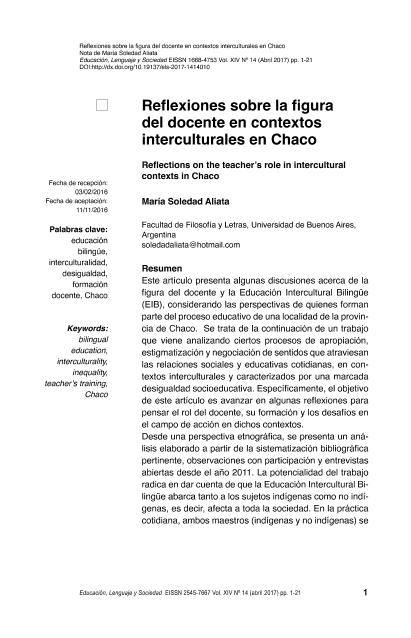Mostrar el registro sencillo del ítem
dc.contributor.author
Aliata, María Soledad

dc.date.available
2022-11-23T16:30:01Z
dc.date.issued
2017-12
dc.identifier.citation
Aliata, María Soledad; Reflexiones sobre la figura del docente en contextos interculturales en Chaco; Universidad Nacional de La Pampa. Facultad de Ciencias Humanas; Educacion, Lenguaje y Sociedad; 14; 14; 12-2017; 1-21
dc.identifier.issn
1668-4753
dc.identifier.uri
http://hdl.handle.net/11336/178712
dc.description.abstract
Este artículo presenta algunas discusiones acerca de la figura del docente y la Educación Intercultural Bilingüe (EIB), considerando las perspectivas de quienes forman parte del proceso educativo de una localidad de la provincia de Chaco. Se trata de la continuación de un trabajo que viene analizando ciertos procesos de apropiación, estigmatización y negociación de sentidos que atraviesan las relaciones sociales y educativas cotidianas, en contextos interculturales y caracterizados por una marcada desigualdad socioeducativa. Específicamente, el objetivo de este artículo es avanzar en algunas reflexiones para pensar el rol del docente, su formación y los desafíos en el campo de acción en dichos contextos. Desde una perspectiva etnográfica, se presenta un análisis elaborado a partir de la sistematización bibliográfica pertinente, observaciones con participación y entrevistas abiertas desde el año 2011. La potencialidad del trabajo radica en dar cuenta de que la Educación Intercultural Bilingüe abarca tanto a los sujetos indígenas como no indígenas, es decir, afecta a toda la sociedad. En la práctica cotidiana, ambos maestros (indígenas y no indígenas) se enfrentan con las mismas dificultades, principalmente la falta de capacitación que habilite a una mayor comprensión del contexto en el cual desarrollan su trabajo, al dominio de recursos didácticos y pedagógicos, entre otros. Es por ello fundamental el rol del Estado y los dispositivos que acompañen estas políticas (capacitaciones, formaciones, etc.) considerando como destinatarios tanto a sujetos educativos indígenas como no indígenas (docentes, directivos, auxiliares, etc); y es también imprescindible el compromiso y la responsabilidad de todos los sujetos que estamos involucrados con la EIB (educadores, investigadores, funcionarios, etc).
dc.description.abstract
This article seeks to present an overview on the role of the teacher and intercultural bilingual education, taking into account the points of view of those who take part in the educational process in a town in the province of Chaco. This was a continuation of the work that analizes processes of appropriation, stigmatization and negotiation of the senses going through everyday educational and social relationships in intercultural contexts. All characterized by a noticeable education and social inequality. This article aims to outline useful thoughts on to reflect upon the teacher’s role and training as well as the challenges in the field of work in such contexts From an ethnographic perspective, we submit an analysis made by systematizing the relevant bibliography, making observations through participation and making open interviews since 2011. The potential of this work lies in realising that Bilingual Intercultural Education encompasses both indigenous and non-indigenous individuals (that is to say, it affects the whole of the society). On their daily practice, both indigenous and non-indigenous teachers face the same difficulties, mainly the lack of training to enable a deeper understanding of the context where they conduct their work, and to allow them to master the didactic and pedagogic resources, among others. This is the reason why the role of the State becomes essential, as well as the mechanisms surrounding these policies (training courses, etc.), considering both indigenous and nonindigenous education agents (teachers, headmasters, assistants, etc.) as the target audience. Likewise, it is also essential to rely on the commitment and responsibility of all the individuals who are engaged in Bilingual Intercultural Education (teachers, researchers, public officers, etc.).
dc.format
application/pdf
dc.language.iso
spa
dc.publisher
Universidad Nacional de La Pampa. Facultad de Ciencias Humanas
dc.rights
info:eu-repo/semantics/openAccess
dc.rights.uri
https://creativecommons.org/licenses/by-nc-sa/2.5/ar/
dc.subject
EDUCACION
dc.subject
INTERCULTURALIDAD
dc.subject
DESIGUALDAD
dc.subject
FORMACION DOCENTE
dc.subject.classification
Otras Ciencias Sociales

dc.subject.classification
Otras Ciencias Sociales

dc.subject.classification
CIENCIAS SOCIALES

dc.title
Reflexiones sobre la figura del docente en contextos interculturales en Chaco
dc.title
Reflections on the teacher’s role in intercultural contexts in Chaco
dc.type
info:eu-repo/semantics/article
dc.type
info:ar-repo/semantics/artículo
dc.type
info:eu-repo/semantics/publishedVersion
dc.date.updated
2022-11-22T09:13:37Z
dc.identifier.eissn
2545-7667
dc.journal.volume
14
dc.journal.number
14
dc.journal.pagination
1-21
dc.journal.pais
Argentina

dc.journal.ciudad
La Pampa
dc.description.fil
Fil: Aliata, María Soledad. Consejo Nacional de Investigaciones Científicas y Técnicas; Argentina. Universidad de Buenos Aires. Facultad de Filosofía y Letras. Departamento de Ciencias Antropológicas; Argentina
dc.journal.title
Educacion, Lenguaje y Sociedad
dc.relation.alternativeid
info:eu-repo/semantics/altIdentifier/url/https://cerac.unlpam.edu.ar/index.php/els/article/view/2212
Archivos asociados
